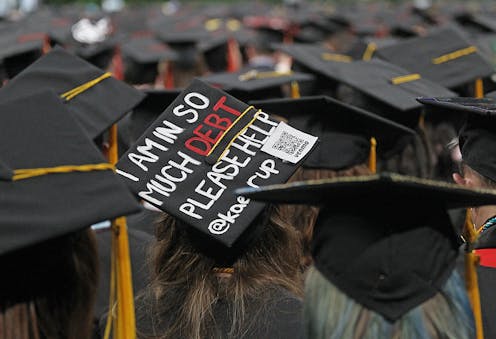Student loan debt is crushing Americans – 4 essential reads
- Written by Jamaal Abdul-Alim, Education Editor, The Conversation

US$1.7 trillion. That’s how much college students and graduates owed in federal student loan debt[1] as of July 2021.
The rising amount of student loan debt can pose serious challenges for individual borrowers. For that reason, colleges and universities and even the federal government have been pursuing solutions to alleviate the burden. But what are the best ways to go about student debt relief? Who should qualify? And what practical effect will debt relief have, not only on individual borrowers but society and the economy as a whole?
To answer these questions, The Conversation sought out an array of scholars – from economists to philosophers – who all specialize to some degree in student loan debt and how it impacts those who borrow.
1. How does student loan debt affect borrowers?
Student loan debt doesn’t just cause financial harm to borrowers. Kate Padgett Walsh[2], an associate professor of philosophy at Iowa State University, argues that it also causes mental[3], emotional[4] and physical harms[5] as well.
Walsh and two other scholars – Dalié Jiménez, a law professor at the University of California, Irvine, and Raphaël Charron-Chénier, an assistant professor of sociology at Arizona State University – write on how student loans affect borrowers[6] well after they graduate.
“Students who are the first in their family to attend college and low-income students have a much harder time paying off their student loans, and they end up defaulting more often than other students,” Walsh and her colleagues write.
Read more: Student loan debt is costing recent grads much more than just money[7]
2. Will student debt relief help the economy?
Some economists argue that relieving student loan debt will help boost the economy[8]. However, William Chittenden[9], an economist at Texas State University, writes that the economic benefits of canceling student debt might be modest at best.
“If all US$1.5 trillion in federal student loans were forgiven, the average borrower would have an extra US$393 per month,” Chittenden writes. “It is estimated that the economy would only grow by about $100 billion, or about 0.5% …”
Chittenden argues[10] that student debt relief should be targeted toward borrowers that typically owe less than $10,000 but who are more likely to default on their loans[11]. Demographically, this would benefit people of color and women the most, since women on average owe more than two-thirds[12] of outstanding student loan debt, and 85% of Black college graduates[13] owe money on student loans, compared to just 69% of white college graduates.
Read more: Canceling student loan debt will barely boost the economy, but a targeted approach could help certain groups[14]
3. Who benefits when colleges clear outstanding balances?
Colleges and universities are using federal money from the American Rescue Plan[15] to clear outstanding debts for students and recent graduates who enrolled in their institution on or after March 13, 2020. Both students and their respective institutions will benefit[16] from this debt clearance, according to Chittenden. The debt clearance will enable students to continue with their education and pursue career goals, he writes. Meanwhile, institutions will be able to clear debts without tapping into their own finances.
“For recent graduates, having debt outstanding to their school may prevent them from obtaining a transcript or proof that they graduated,” Chittenden writes. “By clearing the debts for recent graduates, alums can, as noted by the chancellor of City University of New York, Félix V. Matos Rodríguez, ‘move ahead in pursuit of their educational and career objectives without the specter of unpaid tuition and fees.’”
Read more: Colleges are using federal stimulus money to clear students' past-due debts – an economist answers five questions[17]
4. Is filing for bankruptcy a solution to clearing student loan debt?
As things stand now, student loan borrowers are mostly barred from discharging their loans through bankruptcy. However, under the proposed FRESH START through Bankruptcy Act[18], borrowers can get their federal loan debts discharged if they prove that the debt caused “undue hardship” during the first 10 years of payment.
Brent Evans[19], assistant professor of public policy and higher education, and Matthew Patrick Shaw[20], assistant professor of public policy, education and law, both at Vanderbilt University, explain what proving undue hardship entails[21] for borrowers looking to discharge their student loan debt through bankruptcy.
“Declaring bankruptcy is not an ideal option to deal with student loans because it comes with substantial immediate and long-term consequences,” they write.
Read more: Can student loans be cleared through bankruptcy? 4 questions answered[22]
Editor’s note: This story is a roundup of articles from The Conversation’s archives.
References
- ^ owed in federal student loan debt (fred.stlouisfed.org)
- ^ Kate Padgett Walsh (theconversation.com)
- ^ mental (doi.org)
- ^ emotional (doi.org)
- ^ physical harms (doi.org)
- ^ how student loans affect borrowers (theconversation.com)
- ^ Student loan debt is costing recent grads much more than just money (theconversation.com)
- ^ help boost the economy (www.npr.org)
- ^ William Chittenden (theconversation.com)
- ^ argues (theconversation.com)
- ^ more likely to default on their loans (www.nytimes.com)
- ^ women on average owe more than two-thirds (www.cnbc.com)
- ^ 85% of Black college graduates (www.cnbc.com)
- ^ Canceling student loan debt will barely boost the economy, but a targeted approach could help certain groups (theconversation.com)
- ^ American Rescue Plan (www2.ed.gov)
- ^ Both students and their respective institutions will benefit (theconversation.com)
- ^ Colleges are using federal stimulus money to clear students' past-due debts – an economist answers five questions (theconversation.com)
- ^ FRESH START through Bankruptcy Act (www.congress.gov)
- ^ Brent Evans (theconversation.com)
- ^ Matthew Patrick Shaw (theconversation.com)
- ^ what proving undue hardship entails (theconversation.com)
- ^ Can student loans be cleared through bankruptcy? 4 questions answered (theconversation.com)
Read more https://theconversation.com/student-loan-debt-is-crushing-americans-4-essential-reads-166338

















